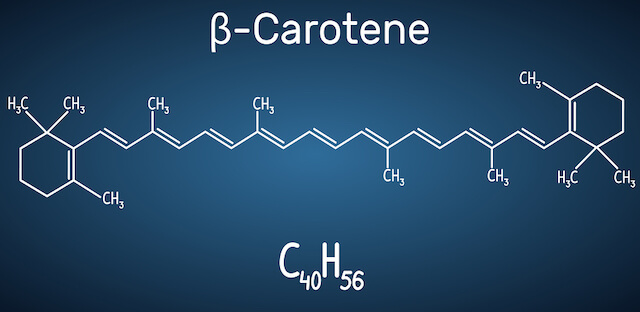Carotenoids, such as β-carotene, are powerful antioxidants. Research about how they reduce the risk of diseases, such as cancer and heart disease, is plentiful. But some research reveals that there are inherent risks of beta-carotene when it comes to smokers or other people with a high-risk for lung cancer.
Do you smoke?

As a health and wellness educator, I would be completely remiss not to address this first. If you are a smoker, your question should not be, “Can I take β-carotene?” Your question should be, “How can I stop smoking?” Smoking increases your risk of various types of cancer, respiratory disease, cardiovascular disease, eye disease, vascular disease, osteoporosis, tooth decay, and more. It affects literally every single body system. If you smoke, I urge you to find a smoking cessation program that works for you.
Is Beta-Carotene a Risk for Smokers?
β-carotene is a carotenoid that converts into vitamin A in the body. Although β-carotene actually reduces the risk of cancer in most people, people who are at high risk for lung cancer may need to use caution. This includes: People who smoke cigarettes or regularly inhale secondhand smoke and people regularly exposed to radon, asbestos, diesel, or other toxic inhalants.

Dosage is Important
Before we start digging into some studies, let’s look at the USDA Recommended Daily Allowance for vitamin A.
Recommended vitamin A intakes for people 14 years and older range between 700 – 900 micrograms (mcg) of retinol activity equivalents (RAE) per day. Recommended intakes for women who are nursing range between 1,200 – 1,300 RAE. Lower values are recommended for infants and children younger than 14. Upper recommended limits range from 1,400 – 1,500 mcg for people over 14 years of age.
Vitamin A is a fat-soluble vitamin. As such, taking too much vitamin A can cause an accumulation in the blood and lead to vitamin toxicity. Daily intake should not exceed the recommended amounts unless under the specific recommendation and monitoring of a health care provider.
Studies About β-Carotene and Lung Cancer Risk
In a 1994 study, β-carotene supplementation in male smokers was found to be significantly associated with an increased risk of lung cancer. Subjects received 20,000 mcg of β-carotene daily, and results showed an increased occurrence of lung cancer as well as ischemic heart disease. This is over fifteen times higher than recommended dosages and thirteen times as high as the upper limits.
Another study published in 1996 took this a step further. In this study, smokers received 30,000 mcg of β-carotene plus 7,500 mcg of retinol (vitamin A) in the form of retinyl palmitate per day. This total of a whopping 37,500 mcg daily resulted in large increased risk of lung cancer. On the basis of these findings, the randomized trial was stopped 21 months earlier than planned.
In 2008, a third study arrived at a similar conclusion. β-carotene supplementation in current smokers was associated with an increased risk of lung cancer. Among former smokers, no significant increase was noted. The average daily β-carotene dosage in these trials ranged from 20,000 to 30,000 mcg daily.
Conclusions
Looking at just these three studies, it appears that large doses of vitamin A cause an increased risk of lung cancer in high-risk patients, such as smokers. Scientists don’t understand exactly how β-carotene increases lung cancer risk in smokers. One hypothesis is that β-carotene, in the presence of cigarette smoke, may convert from having antioxidant properties that destroy free radicals to actually inducing or increasing their production.
On the Other Hand. . .
A review of these studies points out the extreme doses of vitamin A administered. This review states that “no effects or even protective effects against smoke or carcinogen exposure were observed when β-carotene was applied at physiological dosages or in combination with vitamins C and E.”

The key phrase here is physiological dosages. This means the normal amount that is beneficial for functional effects. It is also important to note that the combination of β-carotene with vitamins C and E has a protective effect against lung cancer.
This review somewhat debunks the claims of the other studies, however the need for more research is apparent. It does seem that there are risks associated with beta-carotene for smokers. And certainly, very large doses of vitamin A may not be the best choice if you smoke. But regular recommended doses, especially when paired with vitamins C and E, may be beneficial.
Make a Decision for Better Health
If you smoke, please try to stop. It is the biggest move towards better health and longevity that you can make. In the meantime, if you are not comfortable taking β-carotene or other forms of vitamin A, then don’t. If, however, you want to take a vitamin A supplement, use common sense and take a normal therapeutic dose.
For more information about vitamin A and other beneficial antioxidants, check out 6 Important Vitamins for Eye Health.
Want access to an entire library of health and wellness video education? Come












